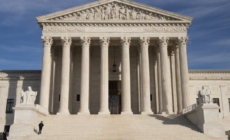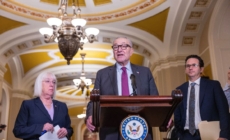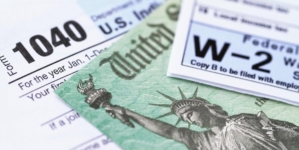-
Supreme Court Changes the Rules for Upcoming Cases - 5 mins ago
-
Dodgers Manager Dave Roberts on Blue Jays: ‘They’re Very Similar to Our Club’ - 14 mins ago
-
Hunters will now be allowed to kill mute swans in California - 35 mins ago
-
Mets Reportedly Interview Son of Braves Legend for Open Coaching Position - 44 mins ago
-
Will Indiana stay undefeated vs. UCLA? 🤔 Joel Klatt Show - 57 mins ago
-
National Geographic names 4 U.S. spots among top travel destinations worldwide - 59 mins ago
-
Lakers Season Opening Loss Raises Major Red Flag - about 1 hour ago
-
‘Outer Banks’ producer Jonas Pate allegedly in physical altercation with assistant - 2 hours ago
-
Record Crowds Join 1956 Memorial “Peace March” in Budapest: Galleries - 2 hours ago
-
Melanie Winter, who advocated for reimagining the L.A. River, dies - 2 hours ago
U.S. debt tops $38 trillion for the first time, worsened by government shutdown
The U.S. gross national debt has surpassed $38 trillion for the first time, U.S. Treasury Department data shows.
The country’s mounting debt comes as the government remains closed, disrupting the economy as hundreds of thousands of federal workers go unpaid.
Government shutdowns can boost the national debt because they delay economic activity and postpone fiscal decisions, while pausing federal programs and starting them up again can also increase costs. The Office of Management and Budget estimated that a 2013 U.S. government shutdown cost $2 billion in lost worker productivity.
“Reaching $38 trillion in debt during a government shutdown is the latest troubling sign that lawmakers are not meeting their basic fiscal duties,” Michael A. Peterson, CEO of the Peter G. Peterson Foundation, a nonpartisan nonprofit focused on fiscal policy, said in a statement.
“If it seems like we are adding debt faster than ever, that’s because we are. We passed $37 trillion just two months ago, and the pace we’re on is twice as fast as the rate of growth since 2000,” he added.
The longest shutdown in U.S. history, the 35-day stalemate in 2018, cost the economy $11 billion, largely to a reduction in spending by federal workers, according to the Congressional Budget Office.
In September, 81% of voters surveyed by the Peterson Foundation highlighted the national debt an issue of concern. According to economists, the growing mountain of debt leads to higher interest costs for the U.S. government.
Interest payments on the nation’s debt are forecast to rise from $4 trillion over the past decade to $14 trillion over the next 10 years, curtailing public and private spending in key economic sectors, the Peterson Foundation said.
Rising U.S. debt could also undermine investor confidence in the economy, David Kelly, chief global strategist with J.P. Morgan Asset Management, said in a report earlier this month.
Credit rating agency Moody’s downgraded the U.S. credit rating in May from its top rating of Aaa to Aa1, reflecting investor concerns about the government’s growing debt. The two other major credit rating agencies, Standard & Poor’s and Fitch Ratings, have also lowered the U.S. rating.
Maya MacGuineas, president of the Committee for a Responsible Federal Budget and a prominent voice on the nation’s fiscal policies, also expressed concern at the national debt topping $38 trillion.
“The reality is that we’re becoming distressingly numb to our own dysfunction. We fail to pass budgets, we blow past deadlines, we ignore fiscal safeguards and we haggle over fractions of a budget while leaving the largest drivers untouched,” she said in a statement. “Social Security and Medicare, for example, are just seven years from having their trust funds depleted — and you don’t hear anything from our political leaders on how to avoid such a disaster.”
Source link































